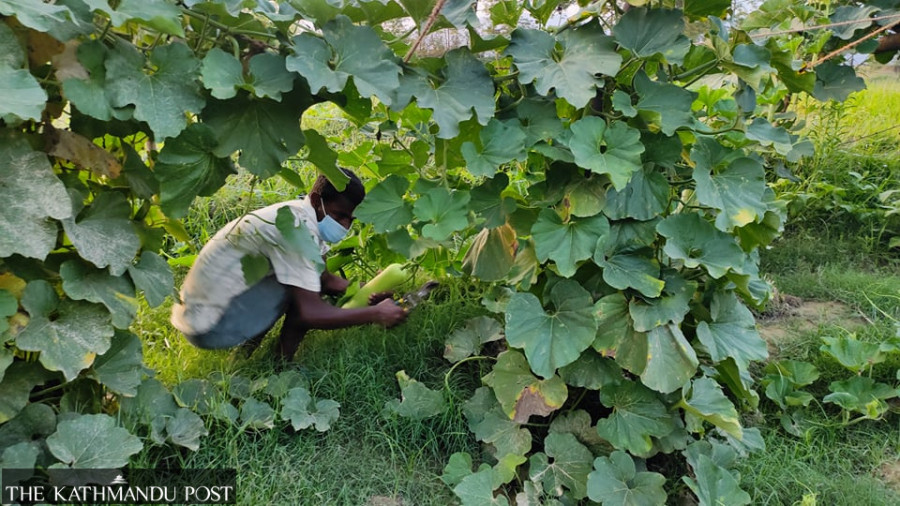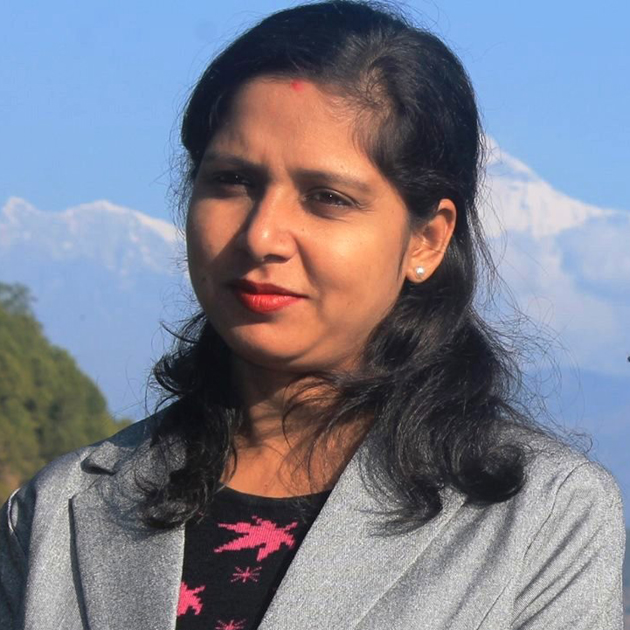Money
Jobless people turn sand bowls into lush green fields
Nepal’s vast riverbeds, mostly unused, have huge potential to be utilised for the poverty alleviation of thousands of landless families.
Amrita Anmol
Tika Devi Poudel in Sainamaina, Rupandehi used to sell vegetables at the market to eke out a living. But in 2020, she lost her job as the Covid-19 pandemic hit the world, including Nepal, causing significant social and economic disruption globally.
Life was difficult for Poudel with a family of six, as she had neither land to grow crops nor any property to put up as collateral for a loan to begin her own business. With no source of income, she was struggling to make ends meet.
But Poudel's fortune changed.
Poudel is now cultivating vegetables on the bank of Ghamah river of Deupar. She has planted bottle gourd, pumpkin, beans, black eye beans, bitter gourd, watermelon and chilli on the farm, thanks to Sainamaina Municipality. The municipality has leased the barren land on the bank of the river for people who have lost their jobs to Covid-19.
Nepal's vast riverbeds, especially in the Tarai area, remain submerged in muddy waters during the rainy season, and dry and desolate for the rest of the year. These unused riverbeds have huge potential to be utilised for the poverty alleviation of thousands of landless families, according to reports.
"After I lost my job, I was looking for work as it was difficult to manage my daily household expenses," said Poudel. “Now, I grow crops which the municipality has leased us and through the income, I am able to cover household expenses.”
The municipality has leased out four bigha and 6 kattha of land to people who have lost their jobs due to the Covid-19 pandemic.
Sixteen families have benefited from the scheme. Each family has been provided 5 katthas of land and all the land in the area has been cultivated.
Meena Kadel of Deupar is also growing crops in the area. Her family returned from India in April after losing their jobs. “We [our family] were jobless for two months and since mid-July, we have started cultivating vegetables.”
"Initially, I wondered about farming on the barren land. It's better than I thought," she said.
The cultivation that started last year has started yielding seasonal vegetables. Once barren land, according to farmers, it has now become a source of income for many.
Chitra Bahadur Karki, mayor of Sainamaina Municipality, said that the land was leased out to people who lost their jobs due to pandemic, migrant workers who have returned and other people who had no source of income.
The municipality has provided the land free of cost for 15 years. The municipality has also provided a free boring machine for the irrigation system in their fields and provided the families with modern agriculture tools to grow crops.
Agricultural technicians have also been deployed to look after the crops and teach modern farming. Technicians have been imparting knowledge to farmers to prevent diseases and pests.
Farmers are not worried about the market as the municipality has also made arrangements for the sale of vegetables. "When all avenues of earning were closed, we got an opportunity through farming. Now we have enough income to cover household expenses," said Gopal Chhetri, one of the beneficiaries of the scheme.
Tens of thousands of Nepalis lost jobs after the government imposed a four-month-long lockdown on March 24 in 2020 due to the escalating coronavirus crisis.
Nepal’s economy faced headwinds, technically recording an economic recession for the first time in almost 40 years with the country witnessing negative growth rates for two consecutive quarters because of the pandemic-induced supply and demand shock on the economy.
According to the Central Bureau of Statistics, in the fourth quarter of the last fiscal year 2019-20, ending mid-July, the country’s economic growth rate, or output of the gross domestic product, plunged 15.4 percent compared to the same period in 2018-19, which resulted in a year-on-year negative growth rate of 1.99 percent.
This is the first annual negative growth rate since 1982-1983 when Nepal’s economic growth rate plunged to -2.97 percent, according to the World Bank.
The negative growth rate continued in the first quarter of the current fiscal year 2020-21.
The second wave of Covid-19 started in late April this year.
According to mayor Karki, more than Rs3 million has been spent to turn the barren land into productive farmland. The scheme was also partly supported by the United Nation Development Programme with the coordination of Seto Gurans Child Development Service, said Karki.
“We have mobilised the money to make jobless people self-employed," he said. This kind of project may spillover to other river banks, which are often considered barren land as well.”
"We thought it was wiser to spend the money provided by the development partners on a productive area rather than holding training and seminars.”




 9.6°C Kathmandu
9.6°C Kathmandu















